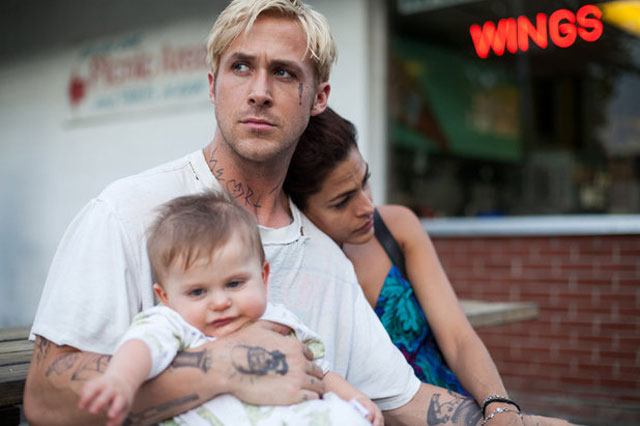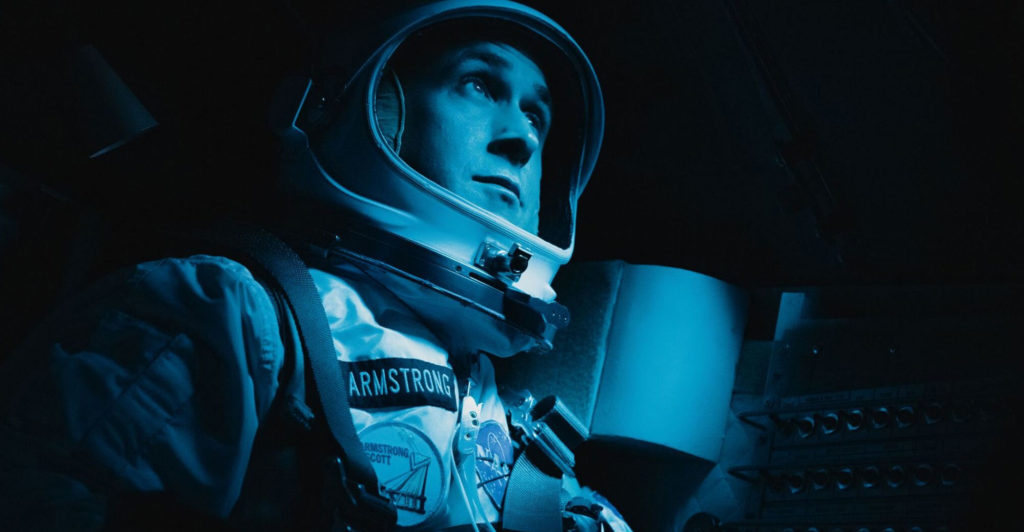
The Place Beyond the Pines announces its ambitiousness with an opening tracking shot so striking that film students will be admiring it for years to come. A shirtless Ryan Gosling, his abdomen tapestried with tattoos, lights a smoke and armours himself in a Metallica T-shirt and leathers as he strides across a fairground.
When he reaches his destination, we learn that he is Handsome Luke, a carnival motorcyclist who entertains small town crowds by buzzing in circles in a steel cage like an angry fly. He is Gosling’s driver in Drive stripped of his doomed heroism — a drifter with nowhere to go and plenty of testosterone to fuel his journey there.
The Place Beyond the Pines reunites Gosling with Blue Valentine director Derek Cianfrance for a crime drama about the legacies fathers bequeath their sons, the inescapable tendrils of the past, and the burdens of guilt and conscience. Flawed but daring, it is a film that achieves a kitchen sink intimacy and panoramic sweep in its depiction of life on the fringes of America.
Gosling shares top billing in the film with Bradley Cooper, but there is no doubt that the presence that dominates the film is that of Luke Glanton. Channelling a young Marlon Brando yet again, Gosling shapes Luke into a tense ball of wounded masculinity, a man whose low, shaky voice is spiked with violence and pain.
If Handsome Luke is dangerous without direction, he becomes lethal when he finds purpose. Passing through Schenectady in New York State, he learns that he fathered a child with ex-lover Romina (a sympathetic performance by Eva Mendes) the last time he was in town. Because he truly cares about the boy, because he is haunted by the absence of his own father, or because his manhood is affronted by Romina’s choice to make a life with a new lover, Luke stays in Schenectady and imposes himself in their lives.
But Luke isn’t fit to provide for a young family and turns to bank robbery as a means to support them. It is a choice that destines him to collide with callow, careerist police officer Avery Cross (Cooper) in events that will reverberate years into the future.
Like the equally somber Blue Valentine, The Place Beyond the Pines is not a comfortable film to watch. It uncoils over nearly two and half hours, every scene tinged with existential dread. The film neither pities nor admires its characters, observing them with a dry detachment as they wrestle fate and their own natures. You’re left to decipher their motivations, which are perhaps as murky to them as to anyone else.
Yet The Place Beyond the Pines is utterly compelling for most of its lengthy running time, with remarkable performances, an ominous score from Faith No More’s Mike Patton, and spare photography from DP Sean Bobbitt giving it a mesmerising pull. Cooper, as Gosling’s counterpart on the other side of the law, continues his evolution from rom-com pretty boy into one of Hollywood’s most versatile actors.
He gives depth to the moral struggles of a man who knows that his status as local hero is woven from a tissue of lies, but uses it nonetheless to advance his career. Supporting performances are excellent, too, with Ray Liotta in fine snarling form as a corrupt cop, Bruce Greenwood as an oily district attorney, and Ben Mendelsohn as an auto mechanic magnetised by Luke’s outlaw charisma.

The Place Beyond the Pines is almost flawless for its first two acts, though the third act swings on a series of coincidences that feel somewhat contrived. Perhaps the parallels it draws between its characters are a little glib and the way it ties up its themes are a little too tidy. But these missteps are easy to forgive in a film of such technical accomplishment and dramatic conviction.
As rich and dense as a Dennis Lehane novel or a Martin Scorsese crime epic, The Place Beyond the Pines sketches intimate portraits of everyday life on the canvas of American bandit mythology. Grandiose, hypnotic, gnarled, moving and challenging, it is sure to feature on many critics’ lists of the best films of the year, and deservedly so. — (c) 2013 NewsCentral Media
- Read more reviews by Lance Harris




